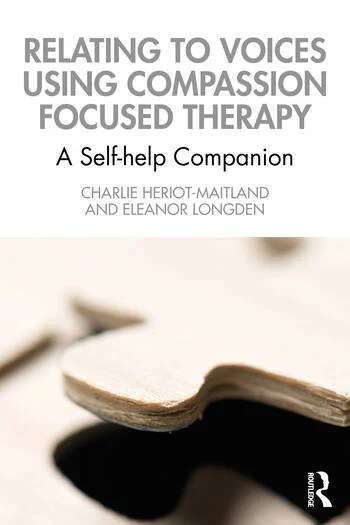I recently wrote a book review for “Relating to voices using compassion focused therapy: a self help companion” by Charlie Heriot-Maitland and Eleanor Longden. Here’s what I said:
“A friend of mine who eventually recovered after spending many years in hospitals being treated for “schizophrenia” complained to me that all the professionals who treated him never mentioned “love” or anything like it – yet that was the essential ingredient he required to heal.
“Professionals have often been taught that to be scientific, they should avoid the “warm and fuzzy” while focusing instead on suppressing or eliminating “psychopathology”. But compassion focused therapy, on which this book is based, takes the opposite stance. It argues that while our brains have evolved to be tricky, and prone to getting stuck in destructive “loops” and inner conflicts, we also have an evolved capacity for compassion, and that the key to healing is learning to use compassion to reconcile with, rather than suppress, the parts of our minds that disturb us.
“This book makes this compassion focused approach accessible to voice hearers. The kindness and humanity of its coauthors (one of whom is herself a voice hearer) are a consistent presence as the reader is thoughtfully guided through possible steps toward changing relationships with voices.
“To begin, voice hearing is normalized as a normal human experience, and reasons to take a compassion focused approach are introduced. Issues of being safe and feeling safe (not always the same thing!) are discussed, and ways to access and/or develop a “compassionate self” are introduced. The next step is learning how to explore one’s conflicting emotions or “emotional selves” from the perspective of the compassionate self. This is good preparation for relating to voices, since emotional conflicts are usually less tricky than are conflicts with voices. Then comes work on developing a compassionate understanding of the voices and of their activity. By considering early experiences and key fears, voice hearers learn to discern how even voices that appear wildly destructive may have a protective intent. Finally, equipped with that perspective, ways of compassionately and wisely relating with the voices and with the emotion behind them are introduced.
“To support this journey, a variety of methods are employed. There are “check-in” boxes that encourage readers to notice how they are responding to what is being introduced, and “practical boxes” that lead the reader in exercises to practice new approaches. There is also a companion website to the book, relatingtovoices.com, which contains audio and print versions of the exercises, along with links to videos and other resources.
“While written as a self-help book, it will also be useful to professionals and to family members who want to increase their ability to support someone in using this approach, even those who may not themselves be inclined to read books.
“One of the persisting myths about mental functioning, which is especially destructive to voice hearers, is the notion that experiences of something hostile or disruptive within our mind is likely the sign of something wrong with our brains. This creates excess dependence on drugs and on a continued battle with whatever is disruptive, in a way that too often inflames into what one of the authors, Eleanor Longden, has referred to as a “psychic civil war”. By instead framing contrary emotions and emotional systems, as well as voices, as all deriving from evolved systems that are trying to help us (even as they may go overboard with that), compassion focused therapy and this book in particular point in a much more hopeful direction, creating possibilities for peace, healing, and the kind of true mental health that has its origin in our hearts.”
Unger, R. (2023). Relating to voices using compassion focused therapy: a self help companion. Psychosis, 1-2. https://doi.org/10.1080/17522439.2023.2172602
[Note that if you are interested in purchasing the book, you can also find it at relatingtovoices.com]





Hi, Ron!
This was such a great read. Thank you for sharing this concept with us. I think it’s such an interesting perspective on voice hearing, and it’s good to know that with compassion-focused therapy people can view their minds as helpful.